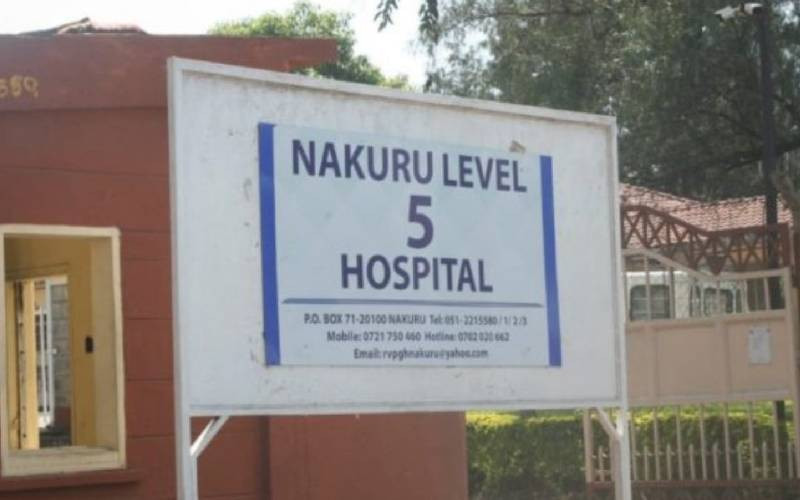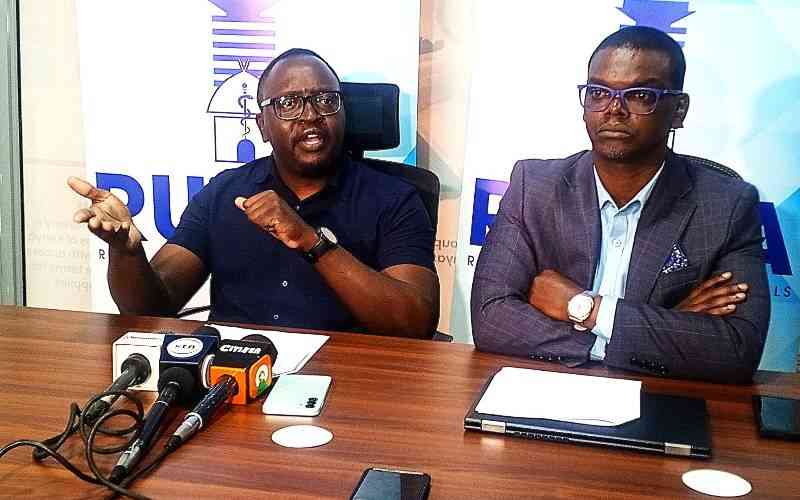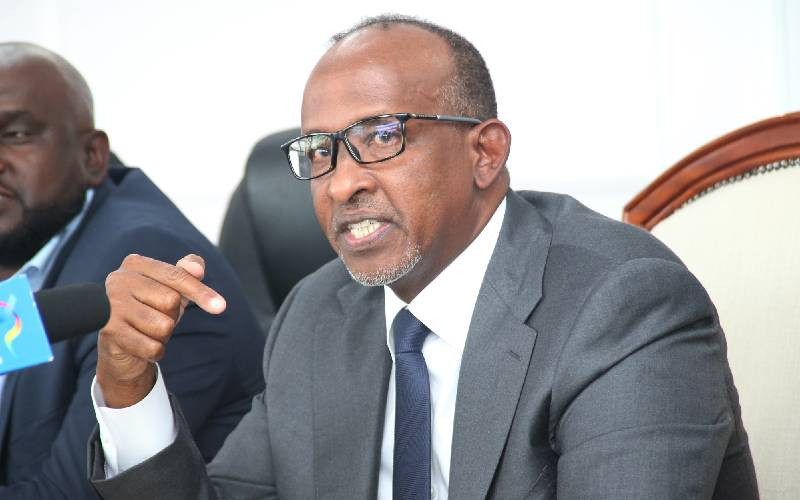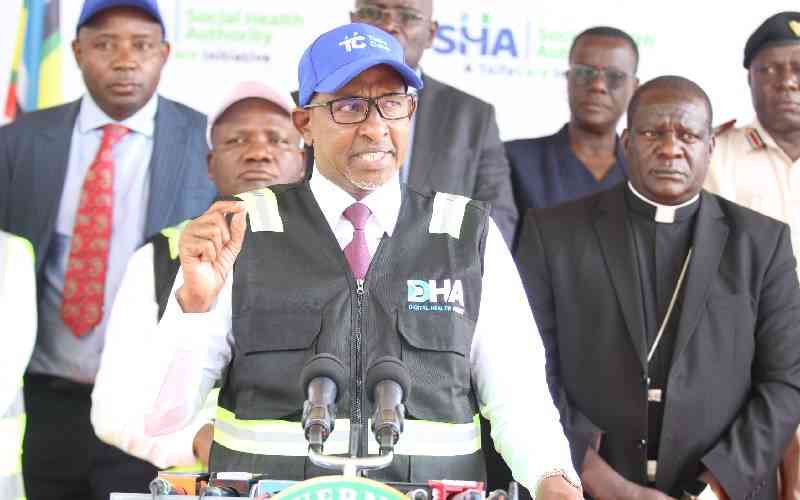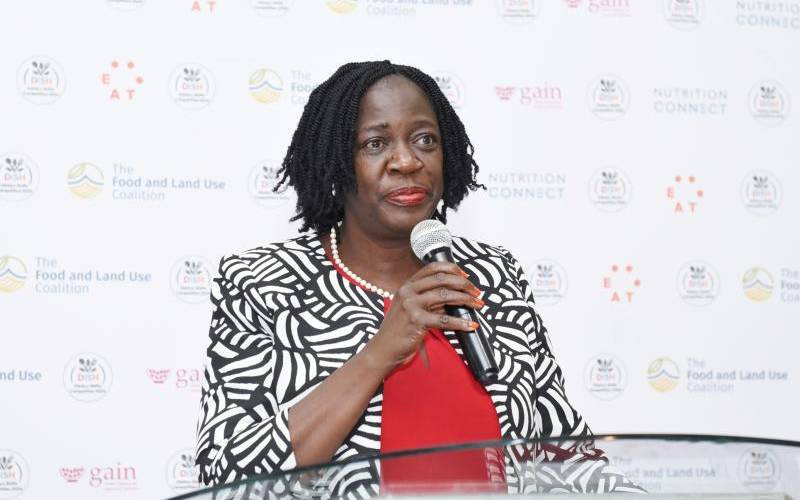
Kirwara Level 4 Hospital in Gatanga sub-county, Murang’a county, is bustling with activity.
At Kirwara Level 4 mothers clutch their children tightly as they wait in the crowded bay, their anxious eyes scanning the room.
Patients fill every corner of the hospital, while doctors and nurses move swiftly, tending to those in need.
In the pediatric unit, weary mothers sit with their toddlers and newborns, soothing their cries.
In the maternity ward, new mothers rest in their beds, while expectant women pace the halls, their faces etched with pain as labor intensifies.
Amidst the daily rush, Kirwara Hospital in collaboration with Jacaranda Health is integrating artificial intelligence to transform maternal healthcare and improve patient outcomes.
Pregnancy and childbirth should be joyous milestones, yet for millions of women globally, they remain perilous experiences.
- Africa's health future in focus at AHAIC 2025 amid US aid freeze
- Time to embrace the healing power of music, it can also motivate you
- Early detection: Lucy's cervical cancer journey and key lessons for you
- Concern as mystery disease kills over 50 people in DRC
Keep Reading
For Maryann Wangui, a 29-year-old mother of two from Murang’a pregnancy was a blessing and terrifying journey.
Without access to regular antenatal care at first, she relied on occasional visits to an overstretched local clinic.
With the many complications that arose during her first pregnancy, she feared the worst—until she was introduced to a simple yet life-saving mobile application powered by artificial intelligence (AI).
This digital tool helped monitor her symptoms and alerted her to seek medical attention before it was too late.
“Before I got enrolled in PROMPTS, I struggled with uncertainty. I could walk to the hospital every time there was a change in my pregnancy which was consumed my time and money,” she says.
“Now, I feel reassured knowing I can receive instant guidance at any time,” adds Maryann.
Today, she holds her healthy baby boy in her arms, grateful for the technology that gave her a fighting chance.
Wangui’s story is one of the many women of Murang’a county and how AI is reshaping maternal health in underserved regions.
In a world where pregnancy-related deaths remain unacceptably high—particularly in low- and middle-income countries—AI-driven solutions are proving to be game-changers.
From the tea plantations of Gatanga to remote villages, expectant mothers face daunting challenges, including a lack of access to ultrasound services, long treks between clinics, and financial barriers that prevent them from receiving timely medical attention.
For women in tea plantation areas, the situation is dire. According to county health officials, many of these women find it difficult to reach healthcare facilities due to the long distance and the cost of services.
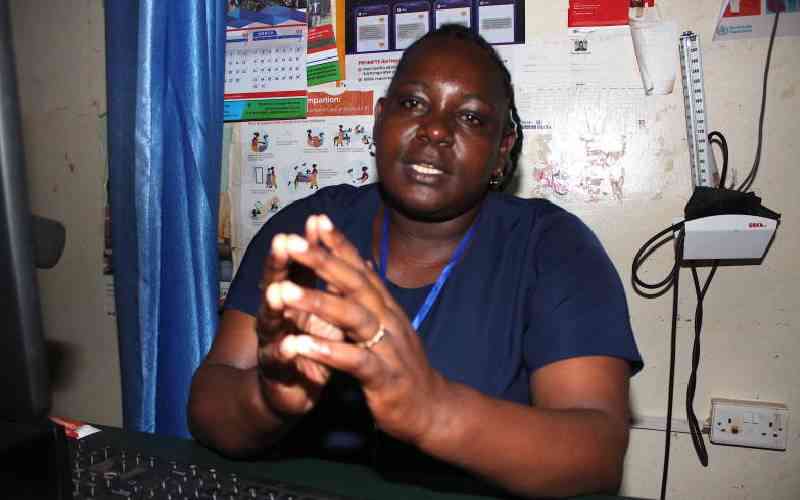
Ultrasound, a crucial part of prenatal care, costs Sh1,000 shillings —an amount that many cannot afford due to socioeconomic hardships.
To bridge this gap, Jacaranda Health, a non-profit organisation, collaborates with the Ministry of Health and county governments to connect expectant mothers with lifesaving information and referral services through an AI-powered SMS platform known as PROMPTS (Promoting Mums Through Pregnancy and Postpartum Through SMS).
This initiative has been instrumental in ensuring that mothers receive timely medical advice, understand potential danger signs, and seek appropriate care when necessary.
According to the World Health Organisation (WHO), a mother dies every two minutes due to childbirth-related complications.
Many of these deaths are preventable, yet a lack of awareness, timely medical intervention, and access to skilled healthcare contribute to fatal outcomes for both mothers and infants. In Kenya, maternal health remains a critical concern.
A 2024 USAID report on Preventing Child and Maternal Deaths ranked Kenya fourth in Africa, with 594 maternal deaths per 100,000 live births. Shockingly, only 42 per cent of births in the country are attended by skilled healthcare personnel, further exacerbating the crisis.
Kirwara Level 4 Hospital, a 22-bed capacity facility, has embraced this digital transformation wholeheartedly.
According to the hospital’s nurse manager Pascalia Mbinya, every expectant mother visiting the hospital for the first time is registered on PROMPTS with their consent.
Since its introduction in 2019, the platform has significantly reduced maternal and neonatal deaths in the county.
“We used to record a higher number of neonatal deaths before PROMPTS was introduced, but now the numbers have dropped drastically,” notes Winfred Njoroge, a public health nurse in Gatanga.
The AI-driven PROMPTS system is designed to triage messages, analyse maternal health queries, and categorise them based on urgency.
If a mother asks a question indicating a potential complication, the system flags it as an emergency, ensuring that healthcare providers respond promptly.
The platform directs the mother to the nearest health facility and transmits her digital records to the hospital in advance, ensuring a seamless transition to in-person care.
"If a mother asks about issues like morning sickness, our team can provide immediate advice," Mbinya explains. For instance, they might suggest dietary recommendations or when to seek medical attention.
Initially, PROMPTS operated as a one-way SMS platform, but many mothers expressed the need for a more interactive experience.
As a result, the system evolved into a two-way communication tool that allows mothers to engage in real-time conversations, receive instant replies, and provide feedback, which continuously improves service delivery.
“They give us feedback on areas we need to improve, and we take their concerns seriously,” says Nurse Mbinya.
So far, over one million mothers across 21 counties have enrolled in PROMPTS.
Jacaranda Health has partnered with more than 930 hospitals to increase access to care and promote proactive health-seeking behavior among pregnant women.
The programme also provides postpartum support, helping mothers navigate postnatal care and prevent postpartum depression.
One of the platform’s highlights is the relatable and culturally sensitive messaging. A mother humorously recalls how a PROMPTS message advised against punishing a child who accidentally drops a phone. Such relatable messages foster strong engagement and trust in the platform.
Beyond AI-driven SMS services, the Murang’a County Government, in collaboration with Jacaranda Health, has invested in training healthcare professionals, including nurses and midwives.
Through the Emergency Obstetric and Newborn Care Mentorship programme, more than 6,500 healthcare providers have received specialised training, equipping them with life-saving skills to handle obstetric and neonatal emergencies.
“Before the training, our nurses lacked certain critical skills, but now they are confident in handling emergencies,” notes Public Health Nurse Njoroge.
While PROMPTS has proven to be a game-changer in maternal health, challenges remain. The reliance on mobile technology means that mothers in remote areas without access to mobile phones may be excluded.
“Not all women went to school around here, making it difficult to read and comprehend messages sent to them,” says Mbinya.
Language barriers also pose a challenge, as some rural mothers primarily communicate in vernacular languages rather than Swahili or English.
"If a mother doesn't have a phone, we encourage her to provide a trusted relative's contact," says Mbinya.
PROMPTS does not stop at delivery. The system follows mothers through what medical professionals call the "fourth trimester" - the critical period after childbirth. Messages cover everything from cesarean section recovery to infant immunisation reminders.
"We've virtually eliminated missed immunisation opportunities," nurse Mbinya notes. The system ensures babies receive vaccinations at the right time, a critical factor in child health.
The numbers tell a compelling story. Antenatal visit rates have nearly doubled. Mothers are more informed, more engaged, and receiving timely, personalised healthcare guidance.
"PROMPTS has made our work easier," Mbinya says. "With a click, we can see how many mothers are enrolled, their responses, and their feedback."
While the current system supports English and Swahili, there's potential for expansion. Discussions are underway to include local languages like Kikuyu, making the service even more accessible.
Despite these obstacles, AI-powered maternal healthcare is a significant step toward achieving Sustainable Development Goal (SDG) 3, which aims to reduce global maternal mortality to less than 70 deaths per 100,000 live births by 2030.
The integration of AI in maternal healthcare is not just about technological advancement—it is about saving lives, empowering mothers, and ensuring that no woman dies due to preventable pregnancy complications.
As technology continues to evolve, initiatives like PROMPTS serve as a beacon of hope, demonstrating that digital innovation can transform healthcare access and outcomes, even in rural Kenya.
AI algorithms are revolutionising early risk detection in pregnant women. By analysing large datasets—including medical records, ultrasound images, and wearable device inputs—AI can identify potential complications before symptoms become critical.
For example, AI-powered platforms can predict the likelihood of preterm labor by assessing subtle changes in a woman’s vitals and alerting healthcare providers for early intervention.
Before the introduction of AI-driven prompt messages, maternal health services in Murang'a County followed a one-way communication model. Mothers would visit clinics, receive services, and be given verbal instructions from healthcare providers before heading home. This system left gaps in patient engagement and follow-up care.
"With prompts, the approach has changed significantly. Mothers are now actively involved in their care. They receive messages on pregnancy stages, nutrition, immunisation, and appointment reminders. This has not only improved the quality of care but also enhanced maternal engagement in their own health journey," says Njoroge.
When an expectant mother visits a clinic, she is screened, guided through laboratory tests, and provided with necessary health services.
She is then introduced to the prompt messaging system, where she registers to receive continuous updates about her pregnancy, tailored nutritional guidance, and reminders for checkups.
"Through the AI system, mothers get messages directly from healthcare providers. They can even reach out with concerns, and in case of complications, a doctor can advise them on whether to visit the facility for emergency care," explains Njoroge.

However, challenges exist, particularly for mothers who lack mobile phones. "We are working on solutions to ensure no mother is left behind."
The AI-powered maternal health initiative is not just about patient care; it also empowers healthcare providers. Before the introduction of prompts, nurses manually relayed health messages without a system to confirm whether mothers understood or followed them. Now, the AI-generated messages ensure that patients are well-informed before their clinic visits, making service delivery more effective.
"Previously, our staff would provide information and hope the mothers retained it. Now, when mothers come in, they already know what to expect from their visit. If they miss a specific service, they are proactive in asking about it," Njoroge says. The shift has encouraged better communication between mothers and providers, improving overall maternal health services.
"The data allows us to track maternal health outcomes at the facility level and make necessary interventions. For example, if a specific test isn't available at a clinic, we can allocate resources promptly to address the issue," notes Njoroge.
Postpartum hemorrhage remains one of the leading causes of maternal deaths. AI-powered prompt messaging has played a critical role in reducing such complications by ensuring early detection and management of risks. Through antenatal screening and urine analysis, potential complications are identified early, allowing timely intervention.
"Before AI-driven prompts, Murang'a recorded high cases of postpartum hemorrhage and maternal deaths. Since the program's introduction in 2019, we have observed a steady decline in such complications," Njoroge states. Although exact figures were not provided, mentorship programs have played a crucial role in equipping staff with skills to handle emergencies and reduce referrals to higher-level facilities.
"Our ultimate goal is to ensure healthy mothers and babies. AI has brought us closer to that vision, but we still need more support in terms of funding, training, and infrastructure to make maternal healthcare even better in Murang'a County."
 The Standard Group Plc is a multi-media organization with investments in media
platforms spanning newspaper print
operations, television, radio broadcasting, digital and online services. The
Standard Group is recognized as a
leading multi-media house in Kenya with a key influence in matters of national
and international interest.
The Standard Group Plc is a multi-media organization with investments in media
platforms spanning newspaper print
operations, television, radio broadcasting, digital and online services. The
Standard Group is recognized as a
leading multi-media house in Kenya with a key influence in matters of national
and international interest.

